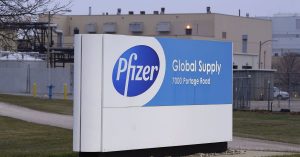Latest
FDA approves Pfizer COVID-19 vaccine
WASHINGTON — The U.S. gave the final go-ahead Friday to the nation’s first COVID-19 vaccine, marking what could be the beginning of the end of an outbreak that has killed nearly 300,000 Americans, according to a person familiar with the decision but not authorized to discuss it publicly.
Shots for health workers and nursing home residents are expected to begin in the coming days after the Food and Drug Administration authorized an emergency rollout of what promises to be a strongly protective vaccine from Pfizer Inc. and its German partner BioNTech.
Initial doses are scarce and rationed as the U.S. joins Britain and several other countries in scrambling to vaccinate as many people as possible ahead of a long, grim winter. It will take months of work to tamp down the coronavirus that has surged to catastrophic levels in recent weeks and already claimed 1.5 million lives globally.
News
11:41 a.m. COVID-19 vaccine shipments set to arrive in states on Monday
WASHINGTON — The nation’s first COVID-19 vaccine will begin arriving in states Monday morning, U.S. officials said Saturday, after the government gave the final go-ahead to the shots needed to end an outbreak that has killed nearly 300,000 Americans.
Trucks will roll out Sunday morning as shipping companies UPS and FedEx begin delivering Pfizer’s vaccine to nearly 150 locations, said Army Gen. Gustave F. Perna of Operation Warp Speed, the Trump administration’s vaccine development program. Another 450 sites will get the vaccine Tuesday and Wednesday.
The locations include hospitals and other sites able to meet the ultra-cold storage requirements for the vaccine. Within three weeks, vaccines should be delivered to local pharmacies and other locations, Perna said at a news conference.
The vaccine was timed to arrive Monday morning so that health workers would be available to receive the shots and begin giving them, Perna said.
It was unclear who would receive the first dose of the vaccine, though health workers and nursing home residents were the priority. Perna said that decision would be determined by health authorities.
The announcement kicks off a massive logistical operation involving the federal and state governments, private companies and health care workers to quickly distribute limited vaccine supplies throughout the U.S.
9:12 a.m. Indiana reinstating surgery limits amid COVID-19 surge
Indiana’s hospitals will have to postpone elective surgeries starting in the coming week under an order the state’s governor said is needed to free up hospital capacity amid steep recent increases in serious COVID-19 illnesses.
An initial shipment of 55,000 doses of the first coronavirus vaccine is expected to arrive at Indiana hospitals shortly as front-line health care workers start to receive shots.
CORONAVIRUS LIMITS
Gov. Eric Holcomb said that hospitals were being directed to postpone all non-urgent in-patient surgeries starting Wednesday and continuing through Jan. 3.
Holcomb said Indiana is “on fire” with coronavirus as the number of Indiana counties with the highest risk level of coronavirus spread more than doubled in the state health department’s weekly update. The tracking map labels 36 of the state’s 92 counties the most dangerous red category, up from 16 a week ago. All other counties are in the next riskiest orange rating.
The state halted elective medical procedures for most of April, but Holcomb lifted that restriction as concerns eased about availability of equipment and protective gear. Still, Indiana’s hospitals are currently treating more than quadruple the number of COVID-19 patients than they were in September, with health officials worried about hospitals being overwhelmed.
“Our nurses and our doctors understandably are overwhelmed and beyond exhausted … to go into one of the toughest environments that anyone in our state’s history has had to face on a day-in, day-out basis,” Holcomb said.
New Cases
Analysis & Commentary
9:14 p.m. Legislative panel should approve nursing home safety rules
Long before the COVID-19 pandemic took hold, Illinois nursing home residents were already vulnerable, suffering and alone.
Illinois nursing homes ranked 50th in the nation for direct care nursing hours per resident per day and were the second worst in the nation for long-stay residents receiving inappropriate use of antipsychotic medication, according to a 2018 AARP report.
More than eight in 10 voters in Illinois back in 2019 said that action should be taken to increase the quality of care in Illinois nursing homes, according to an AARP survey.
Then COVID-19 arrived, making the already tragic circumstances for Illinois’ nursing home residents devastatingly worse.



















